Search
Remove Ads
Advertisement
Summary 
Loading AI-generated summary based on World History Encyclopedia articles ...
Search Results
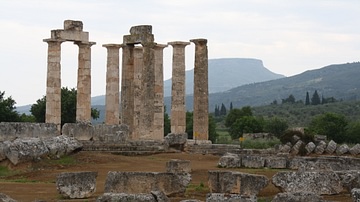
Definition
Nemea
Nemea was a religious sanctuary in the northern Peloponnese of Greece where pan-Hellenic athletic games were held every two years from 573 BCE until 271 BCE, after which, the Games were definitively moved to Argos. Early Settlement Situated...
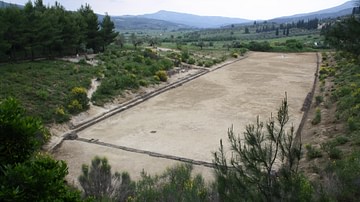
Image
Ancient Stadium, Nemea, Greece
The Panhellenic Games of Nemea were held every two years from 573 BCE to 271 BCE with a brief transferal to Argos between ca. 415BC and ca 330 BCE. Originally, they commemorated the death of Opheltes. The stadium visible today dates from...
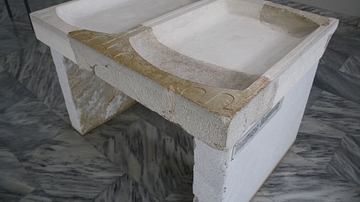
Image
Sacrificial Table, Nemea
Restored stone table on which were placed the sacrificial offerings to the Gods in Greek religious practice. One tray was for the 'Epidaurian Gods' (Apollo & Esklepios), the other for Zeus. (c. 300 BCE). Nemea Archaeological Museum.
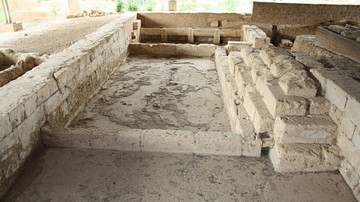
Image
The Bath, Nemea, Greece
The Bath (last third of the 4th century BCE) was used for washing and bathing by athletes (and possibly also spectators) during the games. A large central pool - waist deep - is flanked by two tub rooms with wash basins. The building seems...
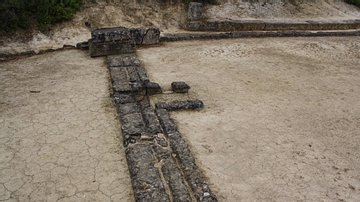
Image
Stadium Starting Block, Nemea, Greece
The starting line or 'balbis' consisted of 12 lanes with posts held in vertical sockets between which a catapult mechanism or 'hysplex' of tensed rope would prevent any athlete from false starting. A judge would simultaneously release the...
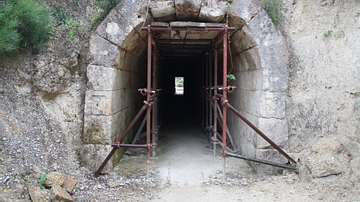
Image
Stadium Entrance, Nemea, Greece
This 36.5m long passageway, constructed in 330-320 BCE leads from the athletes locker room into the stadium and is the entrance through which the athletes would have first appeared to the waiting spectators.
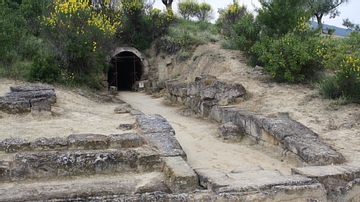
Image
Stadium Entrance Tunnel (East End), Nemea, Greece
Constructed in 330-320 BCE, the entrance to the stadium is mostly hidden from view from the spectators in the stadium and the athletes entrance would have been all the more dramatic.
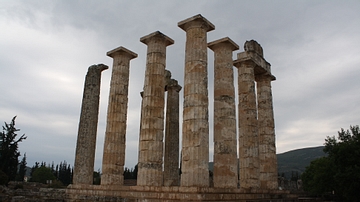
Image
Doric Temple of Zeus, Nemea
The Doric temple of Zeus, Nemea. c. 330 BCE.
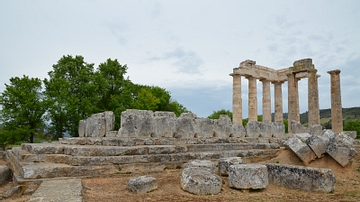
Image
Temple of Zeus, Nemea
The Temple of Zeus at Nemea was constructed during the last third of the 4th century BCE (ca . 330) as part of an extensive building program throughout the sanctuary. Its predecessor, the Early Temple, had been constructed early in the 6th...
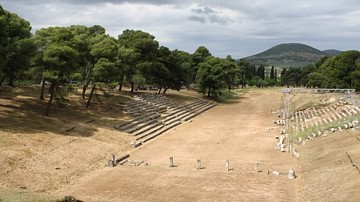
Definition
Stadium
In the ancient Greek world, the word stadium or stadion referred to a measurement of distance, a foot-race, and the place where the race was held and observed by spectators. The Great Games Greek sporting events were closely connected...